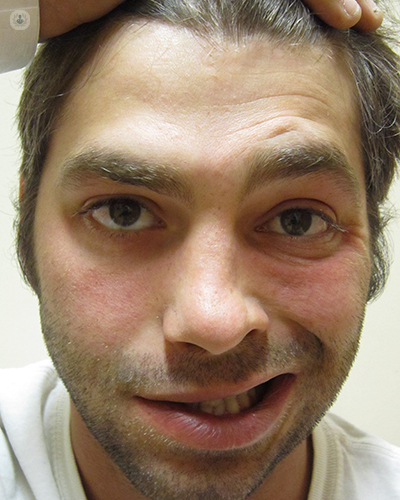Facial nerve
Mr Jonathan Joseph - Otolaryngology / ENT
Created on: 05-07-2015
Updated on: 09-29-2023
Edited by: Jay Staniland
What is the facial nerve?
The facial nerve controls the muscles on the sides of the face, allowing us to smile, wink, cry, frown and make many other facial expressions. The facial nerve also helps us to control our facial movements when eating, drinking and speaking. There are two facial nerves – one on each side of the face which travels around the middle ear, exiting at the skull base and branching from the parotid gland. These branches allow motor function for all of the different facial muscles.
What are some common conditions that affect the facial nerve?
Damage to the facial nerve can result from:
- Trauma or injury (e.g. fractures, facial or ear injuries or surgical trauma)
- Skull base tumours
- Infection (e.g. Lyme disease and Ramsay Hunt syndrome)
- Toxins (alcoholism)
- Stroke and other neurological conditions
- Bell’s palsy (inflammation of the facial nerve)
What are the symptoms of conditions involving the facial nerve?
Facial nerve disorders can result in the following symptoms:
- Drooping of the face
- Facial paralysis
- Weakened facial muscles
- Facial twitches
- Excessive salivation
- Dry eyes
- Changes in taste
Symptoms will depend on the severity of damage caused to the facial nerve.
How can the causes of facial nerve disorders be diagnosed?
If a patient is experiencing symptoms of facial nerve damage, tests will be run to determine the underlying cause, so that the correct treatment can be given.
The following tests may be used:
- Balance test
- Hearing test (to check the health of the auditory nerve)
- Taste test
- Salivation test
- Scans (CT, ultrasound, MRI)
- Electrical nerve stimulation tests
How can facial nerve problems be treated?
Depending on the cause, the following are potential treatments for the symptoms of facial nerve disorders:
- Artificial tears to keep the eyes moist
- Nerve repair or grafts
- Muscle transfers
- Eyelid procedures to reposition the eyelids
- Removing tumours that may be causing the nerve symptoms



